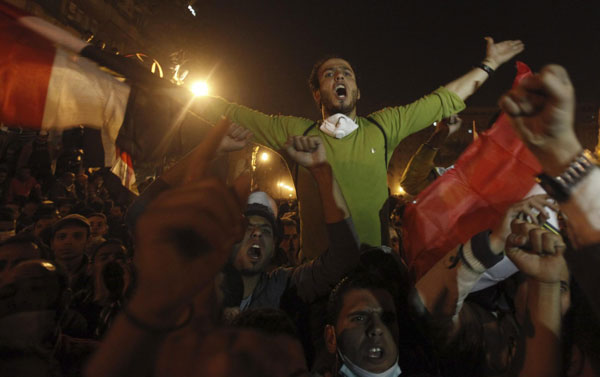Egypt military ruler accepted resignation of govt
Updated: 2011-11-23 09:48
(Xinhua)
|
|||||||||||
CAIRO - The head of Egypt's ruling military council, Field Marshal Hussein Tantawi, said late Tuesday that the council has accepted the resignation of the caretaker government led by Prime Minister Essam Sharaf.
|
 |
|
Protesters chant slogans against head of the ruling military council Field Marshal Mohamed Hussein Tantawi, at Tahrir Square in Cairo November 22, 2011. [Photo/Agencies] |
In a televised address to the nation, Tantawi also announced that the presidential elections will take place by July 2012 and the military regime will hand over power back to a civilian government before July 1 that year.
Tantawi said if necessary a national referendum could be held soon to decide whether the military would transfer the power immediately.
Sharaf's cabinet decided to quit en masse Sunday after clashes between protestors and riot police left a number of people dead and hundreds of others injured.
Tantawi also said the November 28 parliamentary elections will go ahead as scheduled and the military will not meddle in the polls.
The military does not "care about who will win" and "it's up to the people to decide who will rule," he said.
He also denied the military is responsible for the deaths resulted from the latest round of violence hitting Cairo and other cities in recent days.
The Egyptian army "never killed a single Egyptian man or woman, " said Tantawi, head of the Supreme Council of the Armed Forces, who took over the power after the fall of President Hosni Mubarak in February amid popular protests.
It's not clear whether Tantawi's address would help defuse the ongoing crisis in Egypt, which has been rocked by massive protests for five days. At least 28 people have died in deadly clashes between protestors and riot police across the country since Friday.
While Tantawi was delivering the speech, tens of thousands of protestors were gathering in the landmark Tahrir Square in central Cairo, demanding his departure. Protestors say they were angry about the slow pace of reforms.
Sacking Sharaf's cabinet is one of the key demands of protestors, who also call for setting a date for the ruling military council to transfer power to a civilian authority and holding presidential elections before mid-2012.
Sharaf's cabinet spokesman Mohamed Hegazy indicated earlier that the government would continue to discharge its duties until the SCAF decides on the matter. It is not immediately known who will head the new unity government.
The military council has reportedly approached Mohamed ElBaradei, former head of the United Nations' nuclear watchdog IAEA, for the prime minister's position.
Hot Topics
HIV/AIDS, Egypt protest, Thanksgiving, climate change, global economic recovery, home prices, high-speed railways, school bus safety, Libya situation, Weekly photos
Editor's Picks

|

|

|

|

|

|







